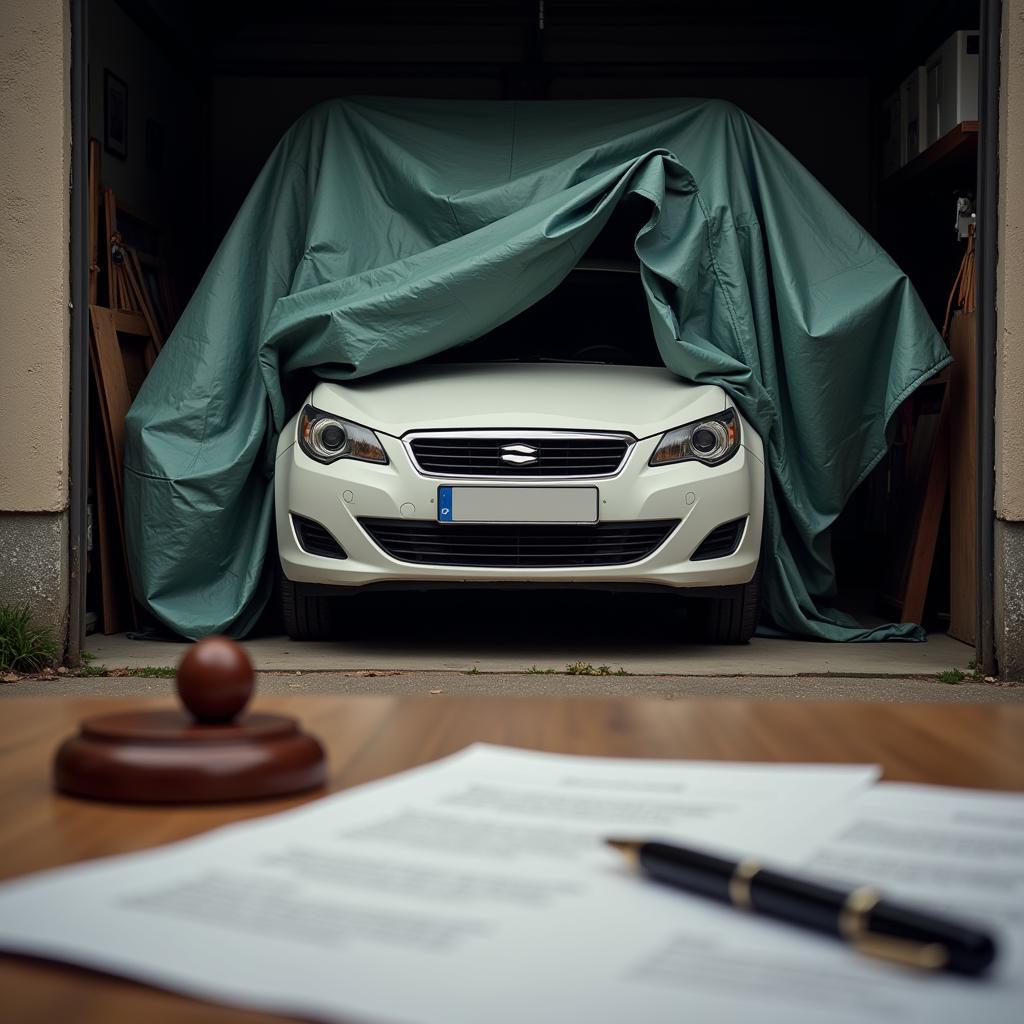Hiding your car from repossession might seem like a quick fix, but what problems legally could arise if you choose this path? It’s a question many car owners facing financial hardship contemplate. This article will delve into the legal ramifications of hiding your car from repossession and explore alternative solutions.
It’s crucial to understand that hiding your car from repossession doesn’t eliminate your debt. In fact, it can lead to more severe legal and financial consequences. While the specifics vary by state, hiding your vehicle can be viewed as a breach of contract and even theft in certain circumstances.
The Legal Repercussions of Hiding Your Car
Hiding your car from repossession can lead to a cascade of legal issues. You’ve signed a contract with the lender, and that contract outlines their right to reclaim the vehicle if you default on payments. By actively hiding the car, you’re violating this contract.
Breach of Contract
The most immediate consequence is a breach of contract. This breach can trigger additional fees and penalties, further increasing your debt. The lender can also pursue legal action to recover these costs. What’s more, a breach of contract can negatively impact your credit score, making it harder to secure loans or other forms of credit in the future.
Possible Criminal Charges
In some cases, hiding your car could lead to criminal charges, particularly if the lender can demonstrate intent to defraud. This means that if you’ve actively concealed the vehicle with the intention of avoiding repossession, you could face legal action. This varies by jurisdiction, so it’s essential to understand the laws in your specific area.
 Legal Problems with Hiding Car from Repossession
Legal Problems with Hiding Car from Repossession
Increased Debt and Financial Strain
Hiding your car doesn’t make the debt disappear. The interest continues to accrue, and you may incur additional fees for late payments and repossession attempts. This cycle can quickly escalate your debt, placing you under significant financial strain. Selling a car without disclosing problems might seem like an easy way out, but it can carry significant legal risks. Similarly, considering should i disclose problems with a car that i’m selling is crucial for ethical and legal reasons.
Alternatives to Hiding Your Car
Instead of hiding your car and facing the potential legal consequences, consider these alternatives:
- Communicate with your lender: Reach out to your lender as soon as you anticipate difficulty making payments. They may be willing to work with you to create a more manageable payment plan or offer other solutions.
- Voluntary repossession: While not ideal, voluntary repossession can mitigate some of the negative impacts of a forced repossession. It can also help avoid the legal risks associated with hiding the car.
- Refinance your loan: Explore the possibility of refinancing your auto loan to secure a lower interest rate or extend the loan term, making your monthly payments more affordable.
- Sell the car privately: If you can sell the car for more than you owe, you can use the proceeds to pay off the loan and avoid repossession. If selling in South Africa, consider the resources available on sell my car with mechanical problems south africa.
 Alternatives to Hiding a Car from Repossession
Alternatives to Hiding a Car from Repossession
“Hiding a car from repossession is like burying your head in the sand,” says John Smith, a seasoned automotive finance advisor at Auto Loan Solutions. “It doesn’t solve the problem; it only makes it worse. Open communication with your lender is key.”
What Happens During Repossession?
Repossession typically involves the lender hiring a recovery agent to locate and seize your vehicle. They have the legal right to take the car from your property, even if it’s parked in your driveway or garage. However, they cannot breach the peace or use excessive force during the process.
Can They Break Into My Garage?
Generally, repossession agents cannot forcefully enter your home or closed garage to retrieve the vehicle. However, if the car is parked in an open driveway or unsecured area, they can legally take it. The specifics of repossession laws vary by state, so it’s crucial to understand the regulations in your area.
“It’s a common misconception that hiding a car guarantees its safety from repossession,” explains Maria Garcia, a legal expert specializing in auto finance. “Lenders have resources and legal avenues to locate and reclaim the vehicle, and the consequences for hiding it can be severe.”
Conclusion
Hiding your car from repossession is a risky strategy with potentially severe legal consequences. It’s always best to be proactive and communicate with your lender to explore alternative solutions. Don’t let fear lead you down a path that could worsen your financial and legal situation. Contact us at AutoTipPro for further assistance. Our phone number is +1 (641) 206-8880 and our office is located at 500 N St Mary’s St, San Antonio, TX 78205, United States.




Leave a Reply